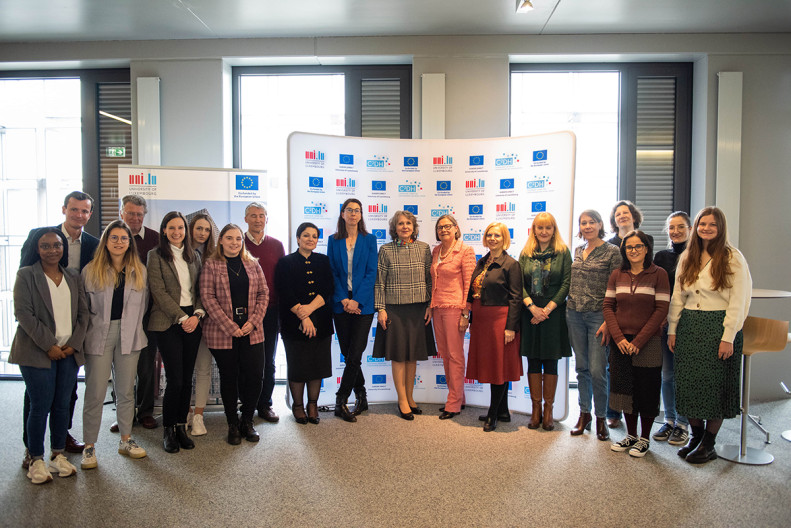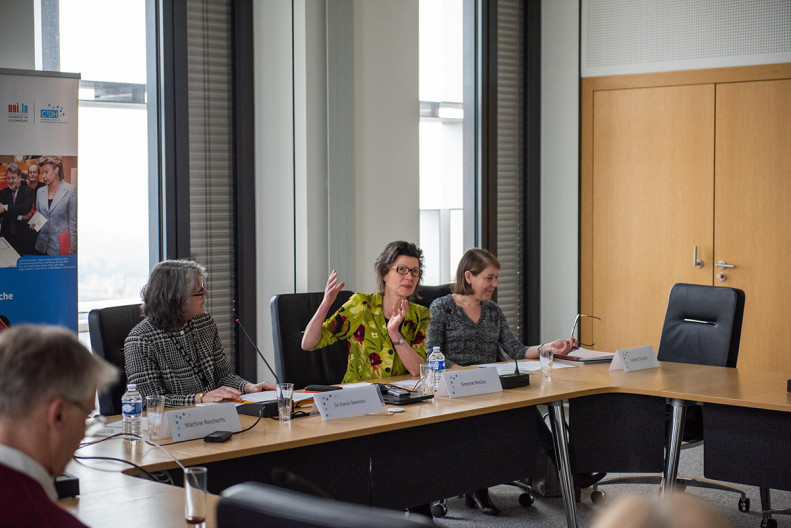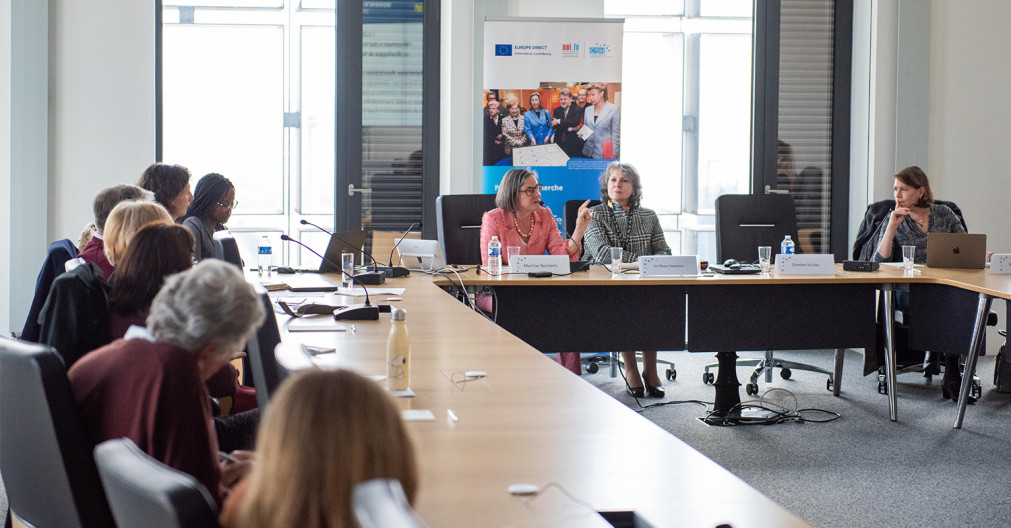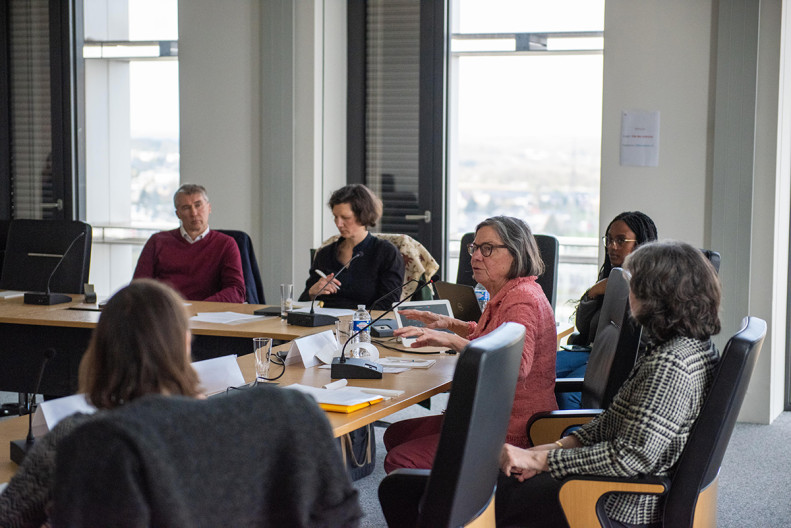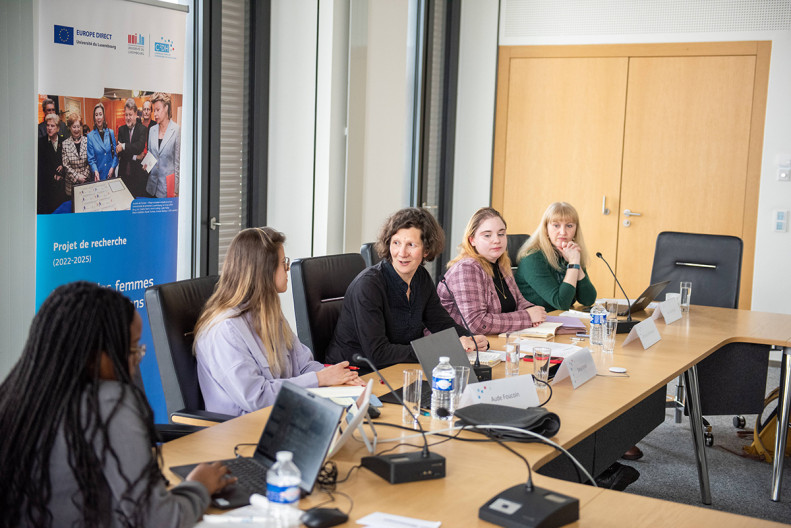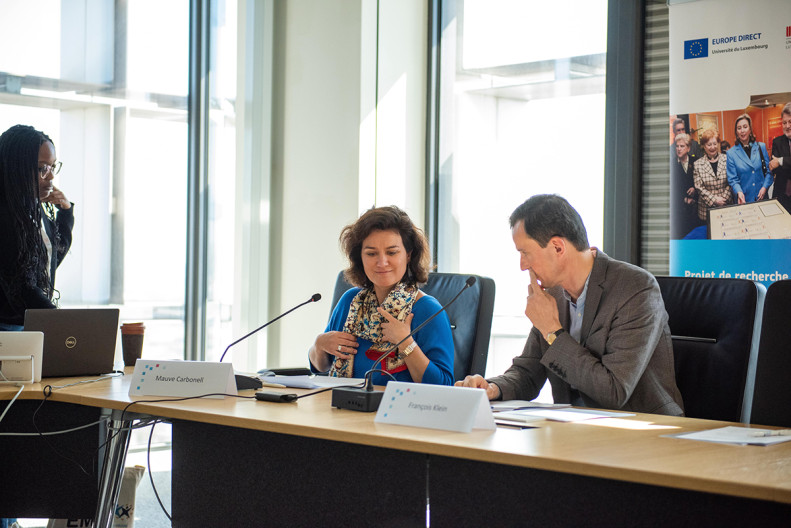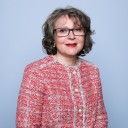On 20 and 21 April 2023 the University of Luxembourg hosted an interdisciplinary conference entitled “Women’s narratives and European integration history”. Organised by the Luxembourg Centre for Contemporary and Digital History (C²DH) and Europe Direct at the University of Luxembourg (ED-UNILU) in connection with the oral history research project “The role of women in European and international relations in Luxembourg” (led by Dr Elena Danescu, a Research Scientist at the C²DH), the conference was attended by outstanding researchers from universities and interdisciplinary research centres in Germany, France, Norway, Italy, Belgium, Greece, Turkey, Poland, the UK and Luxembourg, as well as the European University Institute (EUI) and the Historical Archives of the European Union in Florence.
The conference, which focused on the period after World War Two, aimed to spark discussion on a wide range of topics and approaches, including historiographical traditions, theories and methodologies related to the history of women in Europe in the 20th and 21st centuries; biographies of individual women involved in the development and implementation of the European project; the “female lobby” and how groups and networks developed their influence, political presence and visibility in Europe; women in East-West dialogue and the EU’s enlargement; women and Euroscepticism; gendered perspectives and questions related to democracy and rights; and how digital storytelling can be used to develop new knowledge about the past.
The conference opened with an address by Prof. Dr Simone Niclou, Vice-Rector for Research at the University of Luxembourg, who emphasised the ongoing research priorities at the University of Luxembourg and highlighted the importance of projects exploring the role of women in European integration, gendered perspectives and issues related to European democracy, rights and policies. Prof. Dr Valérie Schafer, Head of the “Contemporary History of Europe” Department at the C²DH, then underlined the significance of new methods and tools such as digital storytelling in developing new knowledge of the past, including questions related to women, from a broad interdisciplinary perspective. Finally, Dr Elena Danescu, a Research Scientist at the C²DH and co-organiser of the conference, alongside François Klein (a Researcher at the C²DH), outlined the aims of the conference against the backdrop of recent developments in research on the history of women, including methodological advances. She particularly spoke about the influence of digital technologies on the production of new knowledge and sources, the key role of oral history, and how current practices such as text mining and network analysis can be used to showcase the stories of women who have been actively involved in the European arena.
There were also contributions from two guest speakers: Dr Martine Reicherts, President of the Luxembourg National Research Fund, and Prof. Dr Mauve Carbonell, Jean Monnet Chair at Aix-Marseille University and President of the Tethys Consortium of Euro- Mediterranean Universities.
The first panel, chaired by Prof. Sonja Kmec (University of Luxembourg), explored the fact that, despite women’s significant participation in the Community institutions since the beginning of the European integration process, they continue to suffer from a persistent invisibility in academic research that needs to be overcome.
- The contribution Gender and career inside the High Authority of the ECSC and the European Commission administration (1952-1995), drafted by Aude Foucoin (European University Institute) explored the gendered nature of careers in the Community administrations, namely the High Authority of the ECSC and the European Commission (women represented 45% of the High Authority’s staff in 1958), from a historical perspective. The author examined the gender prism of the function and structure of the administration (1952-1967) and then analysed the professional backgrounds of a number of unknown female civil servants – such as Miranda Mirrosevich (a shorthand typist and translator), Mimi Dresden (head of social services) and Erna Gurske (an interpreter) – to reveal what their careers can teach us about gender issues and representation within both European administrations.
-
The paper Presence and influence? A study of female representation in the European Parliament during the European Economic Community years, by Winona Kamphausen (Maastricht University) “added a gender perspective” to the history of the European Parliament (Milosevic, 2018) by analysing how the female members of the European Parliamentary Assembly (EPA, 1958-1968) and European Parliament (EP, 1979-1984) gave shape to their representative role (who or what did they represent) and what influence they had. This research aimed to fill the gaps in the under-researched topic of female MEPs in the EEC using archival research, content analysis and a prosopographical and biographical approach combined with the theoretical concept of representation to investigate how female MEPs were represented in the EPA/EP.
-
The contribution Agriculture is a man’s world, but is it? Female MEPs in the Committee on Agriculture (1958-1994) presented by Prof. Carine Germond (Norwegian University of Science and Technology) focused on the EP’s Committee on Agriculture (COMAGRI), one of the oldest and largest parliamentary committees whose size and political clout stood in stark contrast with its purely consultative role in agricultural matters. Moreover, although gendered roles and division of labour (men as head of the family farm and women as “wives”), patriarchal values and beliefs, and a rural masculine identity were still key cultural and socio-economic norms of agriculture, COMAGRI was among the first to include female Members of Parliament (MEPs) and give them prominent roles. For instance, Käte Strobel was the committee’s first female vice-president (1958-1965). After 1979, COMAGRI included a limited but growing number of female MEPs, such as Barbara Castle (UK), Carla Barbarella (Italy) and Astrid Lulling (Luxembourg).
The second panel, chaired by Dr. Katja Seidel (University of Westminster), featured three contributions addressing the question of how women are remembered in history through the collection, preservation and dissemination of historical and new multilingual and multimedia European sources.
- In his paper Capturing women’s history through documentary multimedia collections at the Historical Archives of the European Union: challenges and issues, Dr. Dieter Schlenker (Historical Archives of the European Union, European University Institute) highlighted the efforts made by the HAEU to collect, preserve, inventory and disseminate a variety of sources to honour women in history who have fought for equal rights. Among the individuals who played active roles in women’s rights and women’s emancipation in Western Europe after WWII, he particularly mentioned Fausta Deshormes La Valle (Founder and Director of the Women’s Press and Information Service; in 1992 she was named an honorary member of the European Commission, and she can be considered as one of the “Mothers of Europe”); Simone Veil (a lawyer, politician and feminist who served as France’s Health Minister between 1974 and 1979; she was then elected as President of European Parliament, making her the first President of the directly elected European Parliament and its first female President); Ursula Hirschmann (co-founder of the Movimento Federalista Europeo in 1943; she fled to Switzerland and became involved in organising the first international federalist congress in Paris in 1945); and Yvonne de Wergifosse (a diplomat who in 1962 became Secretary General of the non-governmental European League for Economic Cooperation; she later served as President of International Women’s Commission of the European Movement).
-
Dr. Simona Guerra (University of Surrey) presented the paper No more undocumented: On the first twelve women of the European Chamber, in which she addressed the structural lack of women’s representation in this “his-story”1, and that part of history already defined as incomplete, by introducing the history and political contribution of the first women involved in European integration. Even though it is true that there were less women in politics at the time, some still sat in the Common Assembly and held important national, European and international roles. By means of in-depth archival research and analysis of the minutes of meetings, the paper outlines how these women actively contributed to the process of European integration in the early years.
-
In their paper Women in international relations in Luxembourg: Pioneers and their memories, Dr Elena Danescu and François Klein (Luxembourg Centre for Contemporary and Digital History) began with the observation that the presence and influence of women in international relations and diplomacy in Luxembourg is a subject that has received little attention in contemporary historiography. In this context and given the absence of systematic archive sources, oral history not only represents a novel and original source; it is also the most appropriate way of elucidating the role of female figures in European and international relations in Luxembourg after the Second World War. The aim of this oral history research project started in 2022 with the support of the Media Centre at the University of Luxembourg is to conduct semi-structured filmed interviews with women from a wide range of backgrounds (political, diplomatic, economic, trade union, cultural, technocratic, civil society, etc.) whose action left a mark on European and international relations in Luxembourg. Until now have been realized interviews with Astrid Lulling, Colette Flesch, Erna Hennicot-Schoepges, Martine Reicherts and Viviane Reding (which means more than 23 hours of recording). These new multimedia resources will be published – in full, as a series of themed excerpts and in transcription form – on the C²DH research infrastructure, and will also be shared with the Historical Archives of the European Union in Florence.
- 1. Cf. Abels and MacRae, in Abels, Krizsán, MacRae and van der Vleuten, “The Routledge Handbook of Gender and EU Politics’’, Routledge: London, 2021.
The third panel, chaired by François Klein (Luxembourg Centre for Contemporary and Digital History) explored biographical perspectives and individual women in the development and implementation of the European project.
- Bastian Matteo Scianna (University of Potsdam) gave a presentation on Madame Europe: Katharina Focke, the German Social Democrats and European integration. The biographical focus on Focke allowed the author to showcase the role of non-governmental European lobby organisations, the European bearing of the Social Democratic Party of Germany (SPD), integration policies under Chancellor Willy Brandt between 1969 and 1974, and links between development policy in national parliaments and the European Parliament (EP), of which Focke was a member from 1979 until 1989. The spotlight on Focke not only emphasised the role of women in European integration but also challenged the conventional focus on the “founding fathers” and analysed the influence of integrationist lobby organisations and the Europhile wing of the SPD.
-
In her paper Formal and informal diplomacy: Miriam Camps and European integration, Dr Katja Seidel (University of Westminster) highlighted the unusual personal trajectory of Miriam Camps (1916-1994), a US diplomat, journalist, economist and scholar. Camps was involved in the design of early post-war European integration organisations at the State Department in the 1940s and continued to play a central role in developing US foreign policy on Europe until the late 1960s. Her practical experience as a formal and informal diplomat – from the late 1950s she was affiliated with elite foreign policy think tanks – informed her output as a scholar.
-
The audiovisual contribution by Dr Agnès Hubert (Visiting Professor at the College of Europe and expert at the Foundation for European Progressive Studies) was a documentary film entitled Eliane Vogel Polsky – A biographical digital story. The film explored the history of this remarkable woman, who was a leading activist for gender equality. A graduate of the Université libre de Bruxelles, her skills as a researcher and legal expert led her to become a pioneer in the gender equality movement at European level, and she is now considered as a founding figure in the development of a social Europe.
The fourth panel, chaired by Dr Elena Danescu (Luxembourg Centre for Contemporary and Digital History), considered approaches to women in Central and Southern Europe and on the continent’s Eastern borders, with a particular focus on individual biographies, the feminist lobby and women’s struggle for gender equality as reflected in media sources.
- In her contribution entitled The price of “true story”: The history of European integration in the autobiographical prose of Agnieszka Osiecka, Katarzyna Hanik (University of Silesia in Katowice) aimed to present a uniquely original female narrative of the European integration process through the autobiographical writing of Agnieszka Osiecka, who tried throughout life to stay apolitical while at the same time being a writer, and who in 1988 created a deeply political “female voice of a generation” with her play “The White Blouse”. Agnieszka Osiecka, a writer who saw herself as powerless in the face of the changes unfolding around her, is an excellent commentator of the transformations that took place in Poland from the post-war period to the fall of the Iron Curtain and the country’s alignment with Western European ideas.
-
Marina Bantiou (University of Thessaly) presented the contribution Aspects of the participation of Greek women in the European Women’s Lobby: Three narratives. Her presentation focused on the European Women’s Lobby, which was founded in 1990 and is the largest coalition of NGOs promoting women’s rights in the European Union, through the case of three Greek women based on their oral testimonies from the archive of the Library of Equality and Gender Issues, a project implemented by the National Centre for Social Research in Greece. Based on content analysis, the research looks at three life narratives – Kaiti Paparriga Kostavara, a member of the European Commission of Inquiry on sexual harassment in the workplace and national researcher for Greece (1996-1997); Ioanna Magganara, from the European Women’s Lobby; and Efi Kalliga, a member of the National Council of Greek Women and the European Women’s Lobby.
-
The paper Rethinking of European women’s effort for gender equality, by Meliha Nur Çerçinli (Republic of Turkey Presidential State Archives), explored the changing perception of women’s social role and rights as reflected in the media in Turkey after WWII. This shift was a challenging one, both for women who were building a new identity and for men who were not accustomed to this new image of women. In the process of accepting women as players in the political arena and employees with equal status and pay in business life, difficulties were encountered in terms of both decision-making and implementation. The author provided examples from the press of non-Western countries to offer new insights into the image of European women. Reflections on the historical dynamics that shape social consciousness when it comes to gender and the new roles of women in social life highlight the need for further critical research on gender equality.
The conference proceedings will be published in late 2023 by De Gruyter Academic Publishing House.



